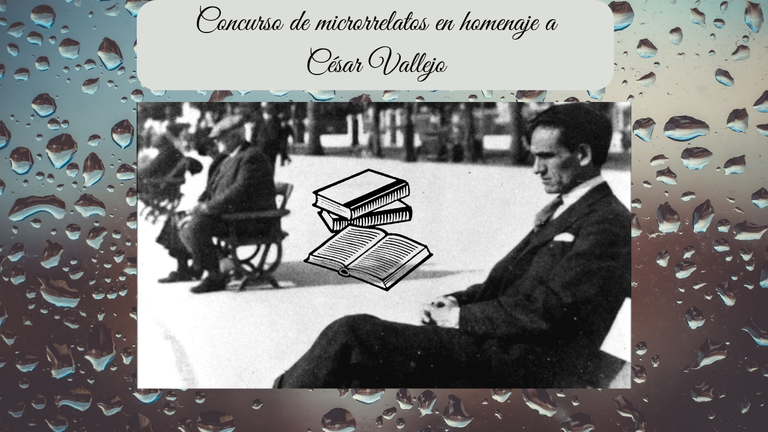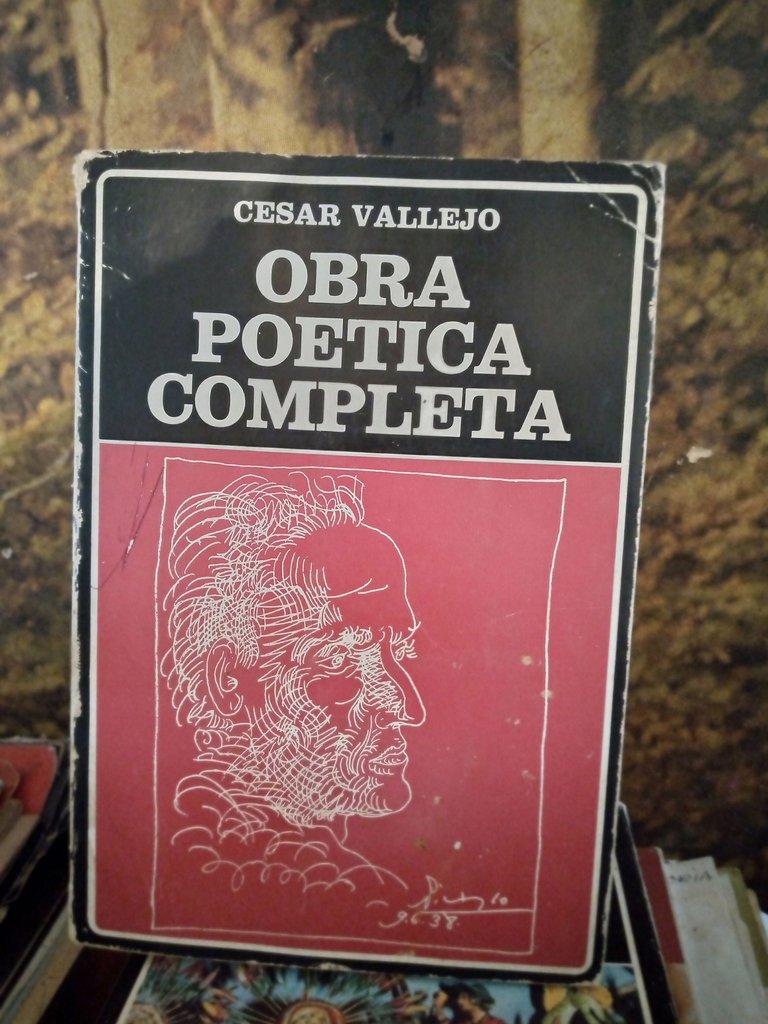Entrada al Concurso de microrrelatos de Literatos | Cavilaciones de hombre sentado en el banco (Spanish-English)


Saludos amantes de la literatura en nuestra plataforma, con el microrrelato que les comparto participo en el concurso que la comunidad @es-literatos nos ha propuesto en homenaje a una de las grandes voces latinoamericanas de todos los tiempos, César Vallejo. Aunque quizá sus textos escritos en verso son los más conocidos, también escribió en prosa poética. Desde sus primeros versos publicados en 1919, en su libro “Los heraldos negros”, el poeta nos dejó hondos versos sobre la condición humana, el dolor y el sufrimiento, la injusticia, pero también el deseo de amar y vivir.

CAVILACIONES DEL HOMBRE SENTADO EN EL BANCO
Y yo te digo: Cuando alguien se va, alguien queda. El punto por donde pasó un hombre, ya no está solo
Aquella mañana fría salí a caminar, necesitaba tomar un poco de aire, las musas me habían abandonado, la novela que estaba escribiendo no avanzaba, quizá la cercanía del mar podría inspirarme. Caminé por las calles de Niza pensando en el personaje de mi novela, el príncipe inca Túpac Yupanqui, el reino legendario de los Sciris. Me senté en un banco ensimismado, sentí nostalgia de mi patria lejana, mi familia, mi querida madre; pero también rememoré las ciudades que había visitado con Georgette ese año, mi primer viaje a Rusia, Moscú, Leningrado, pero también Berlín, Colonia, Viena, Budapest, Varsovia, Praga, Roma, Trieste, Florencia, Venecia, Pisa.
El destino, ¿qué es el destino? Pequeños pasos en la nieve, en una mañana fría de invierno, noches de amor o de ausencia, que se borrarán. Querida Georgette, nada puedo prometer. El año próximo quiero visitar Madrid y algunas otras ciudades españolas. Soy un poeta trashumante, un hombre sin lugar preciso, un desterrado. Quizá mi única patria es el poema, el espacio imaginario de la literatura, donde puedo estar a mis anchas; pero también debo luchar por un mundo mejor, por un destino más digno para la mayoría de los hombres. El destino, ¿qué es el destino? Si no puede compartirse.
Aquella mañana fría salí a caminar y al sentarme un rato, cerca del mar, me llamó la atención aquel hombre hombre alto, delgado, cabizbajo, de tez morena, quizá indio, que no miraba a su alrededor, parecía solitario, afligido. Quizá estaba preocupado por algo, sus manos cruzadas delataban a un hombre concentrado en sus pensamientos, un hombre inteligente que reflexiona, un hombre sabio. No quise interrumpirlo.
Aquella mañana fría el poeta peruano César Vallejo se encontraba en Niza, seguía sin concentrarse y avanzar en la escritura de la novela que quería escribir sobre el mundo de los incas “El reino legendario de los Sciris”, había leído algunos libros, pero no encontraba la trama. Decidió ir a caminar un rato, Georgette quiso acompañarlo, pero le dijo que prefería estar solo. Ella lo ayudó a ponerse la corbata y el saco, para que saliese abrigado. Lo besó antes de que saliera. Muy lentamente inició su caminata hasta sentarse en un banco. Quizá el frío le hizo añorar su patria lejana, su hogar, el calor del afecto materno. El recuerdo de su madre lo llevó a rememorar los viajes con Georgette por diversas ciudades de Europa, sí, ella también lo cuidaba, lo quería. El poeta solitario suspiró melancólico y aprendió el camino de regreso a su hospedaje.


Greetings lovers of literature on our platform, with the micro-story that I share with you I participate in the contest that the @es-literatos community has proposed in tribute to one of the great Latin American voices of all time, César Vallejo. Although perhaps his texts written in verse are the best known, he also wrote in poetic prose. From his first verses published in 1919, in his book "Los heraldos negros", the poet left us deep verses about the human condition, pain and suffering, injustice, but also the desire to love and live.

MUSINGS OF THE MAN SITTING ON THE BENCH
And I tell you: When someone leaves, someone remains. The point where a man passed through is no longer alone.
That cold morning I went for a walk, I needed to get some air, the muses had abandoned me, the novel I was writing was not progressing, perhaps the proximity of the sea could inspire me. I walked through the streets of Nice thinking about the character of my novel, the Inca prince Tupac Yupanqui, the legendary kingdom of the Sciris. I sat on a bench in a deep sleep, nostalgic for my distant homeland, my family, my beloved mother; but I also remembered the cities I had visited with Georgette that year, my first trip to Russia, Moscow, Leningrad, but also Berlin, Cologne, Vienna, Budapest, Warsaw, Prague, Rome, Trieste, Florence, Venice, Pisa.
Destiny, what is destiny? Small steps in the snow, on a cold winter morning, nights of love or absence, that will be erased. Dear Georgette, I can promise nothing. Next year I want to visit Madrid and some other Spanish cities. I am a transhumant poet, a man without a precise place, an exile. Perhaps my only homeland is the poem, the imaginary space of literature, where I can be at ease; but I must also fight for a better world, for a more dignified destiny for the majority of men. Destiny, what is destiny? If it cannot be shared.
That cold morning I went for a walk and as I sat for a while, near the sea, my attention was caught by that tall, thin, crestfallen man, with a dark complexion, perhaps Indian, who did not look around, he seemed lonely, afflicted. Perhaps he was worried about something, his folded hands betrayed a man concentrated in his thoughts, an intelligent man who reflects, a wise man. I did not want to interrupt him.
That cold morning the Peruvian poet César Vallejo was in Nice, he was still not concentrating and advancing in the writing of the novel he wanted to write about the world of the Incas "The legendary kingdom of the Sciris", he had read some books, but he could not find the plot. He decided to go for a walk for a while, Georgette wanted to accompany him, but he told her he preferred to be alone. She helped him put on his tie and coat, so he could go out warm. She kissed him before he came out. Very slowly he began his walk until he sat down on a bench. Perhaps the cold made him long for his distant homeland, his home, the warmth of his mother's affection. The memory of his mother led him to recall the trips with Georgette through various cities in Europe, yes, she also cared for him, she loved him. The lonely poet sighed melancholy and learned the way back to his lodging.
Translated with DeepL.com (free version)

literatos
spanish
literature
concurso
microrrelato
writing
hivewriters
creativewriting
creativecoin
neoxian
0
0
0.000
Esta publicación ha recibido el voto de Literatos, la comunidad de literatura en español en Hive y ha sido compartido en el blog de nuestra cuenta.
¿Quieres contribuir a engrandecer este proyecto? ¡Haz clic aquí y entérate cómo!
Gracias por el apoyo.